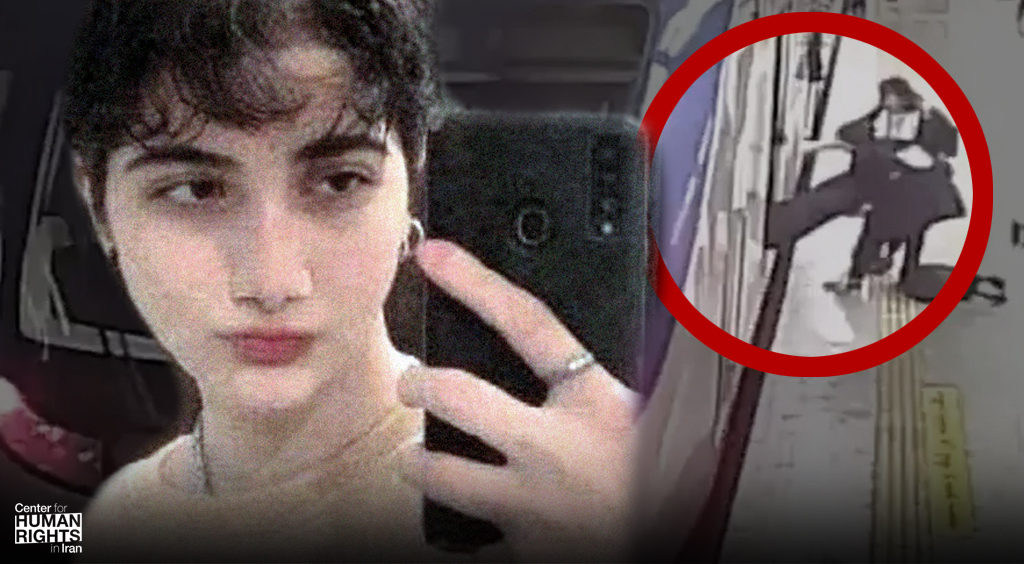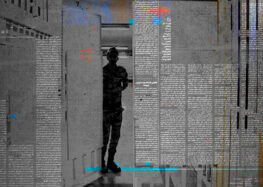Outrage After 16-Year-Old Girl Hospitalized Following Reported Assault by “Hijab Guards”
 Journalist Who Interviewed Victim Detained While Interviewing Mother
Journalist Who Interviewed Victim Detained While Interviewing Mother
Like Mahsa Jina Amini Case, Family Under Intense Pressure
October 4, 2023 — Reports of yet another young girl being hospitalized in a coma after being assaulted by a state security unit newly launched to police compliance with women’s hijab laws in Iran demand an immediate and strong response from the international community and investigation by the UN’s Fact-Finding Mission on Iran.
“A year after the killing of Mahsa Jina Amini in Iranian state custody following her arrest over her hijab, and after hundreds of killings by state security forces in the streets during the protests that followed, another young woman is in critical condition and another family in Iran is in the same heart-wrenching situation,” said Hadi Ghaemi, executive director of the Center for Human Rights in Iran (CHRI).
“The Iranian government’s history of violence against women and its culture of impunity cannot be denied,” Ghaemi said. “The international community must join together to impose meaningful and coordinated diplomatic costs on a government that is now regularly killing its citizens in order to silence them.”
Military Hospital Blocks All Visits as Girl Lies Unconscious
On October 1, 2023, a girl identified as 16-year-old Armita Geravand was pulled unconscious out of a Tehran metro car by four people, as shown by video footage published on Iranian state TV. The edited clips eventually cut to her being taken away by emergency first responders.
“Based on information that I’ve received, a high school girl was taken to Fajr Air Force Hospital tonight [October 1, 2023]. She was without a headscarf in the metro with her friends and the officers got hold of them and pushed the girl, and her head hit a metal bar and she fainted. At the moment, they don’t allow anyone to approach her in the hospital,” tweeted Amsterdam-based Iranian Radio Zamaneh reporter Farzad Seifikaran.
Geravand, a Taekwondo athlete, is now being treated in the intensive care unit of the military’s Fajr Hospital within a high-security section that has been sealed off to visitors by state security agents.
Little is known about the state security unit that allegedly assaulted Geravand, other than unlike the morality police, which police all men and women’s behavior and clothing in public, the “Hijab-baan,” which translates to hijab guard, were launched this year in tandem with a new bill expected to soon become law that imposes further punishments on unveiled women.
The unit is comprised of individuals hired by the Tehran municipality to enforce hijab-compliance in public areas, including the Tehran metro. On August 7, the Etemad daily reported that 400 of them had been hired by the municipality.
CHRI has issued a stark warning that the “Chastity and Hijab Law” not only violates due process rights, denying women in Iran a fair trial before punishment, and exacerbates gender-based discrimination by denying services to “improperly” clad women—it will also breed increased violence against women in the country.
It is essential to note that reports of violence against women by state hijab-enforcement units have surfaced in Iran even before the bill officially becomes law.
On October 3, after outrage grew on Iranian social media, Iranian state TV released video footage featuring Armita’s parents stating that she had suffered an accident, though they never explicitly mention her name.
Islamic Republic agents have a documented history of putting individuals and the family members of those detained or abused in state custody under intense pressure, which includes threats of violence and imprisonment, to either remain silent or issue coerced public statements. Iranian state media then typically broadcasts these forced statements, which have been orchestrated by Islamic Republic intelligence agents, to manipulate public opinion.
Notably, Shargh newspaper reporter Maryam Lotfi was detained while trying to interview Armita’s mother. She was later released.
“Girls are subjected to violence on the streets, and then their families are compelled to protect the government responsible for that violence,” Ghaemi said.
“The government of the Islamic Republic of Iran should be placed under increased diplomatic isolation until it gets the message that continuing to repress, maim, and kill young women is not acceptable to the international community and will carry painful consequences,” Ghaemi added.
Read this article in Persian
This report was made possible from donations by readers like you. Help us continue our mission by making a tax-deductible donation.






